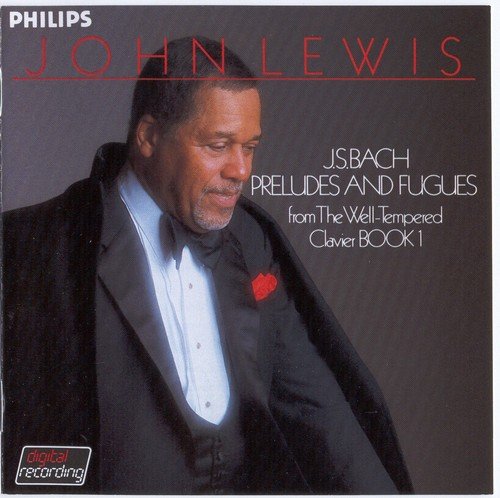
John Lewis - Bach: Preludes and Fugues from the Well-Tempered Clavier Book 1-4 (1985 - 1990)
BAND/ARTIST: John Lewis
- Title: Bach: Preludes and Fugues from the Well-Tempered Clavier Book 1-4
- Year Of Release: 1985 - 1990
- Label: Philips
- Genre: Jazz, Classical
- Quality: FLAC (image+.cue,log)
- Total Time: 03:52:42
- Total Size: 840 MB
- WebSite: Album Preview
Tracklist:
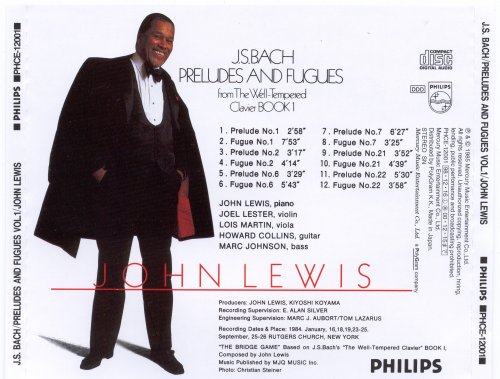
CD1 - 0:56:20
01. Prelude No. 1 - 3:02
02. Fugue No. 1 - 8:00
03. Prelude No. 2 - 3:22
04. Fugue No. 2 - 4:19
05. Prelude No. 6 - 3:32
06. Fugue No. 6 - 5:48
07. Prelude No. 7 - 6:31
08. Fugue No. 7 - 3:33
09. Prelude No. 21 - 3:55
10. Fugue No. 21 - 4:46
11. Prelude No. 22 - 5:33
12. Fugue No. 22 - 4:00
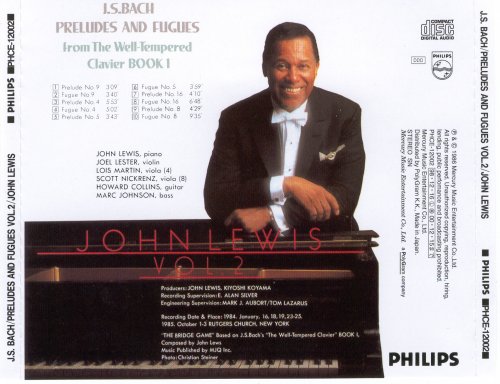
CD2 - 0:51:29
01. Prelude No. 9 - 3:12
02. Fugue No. 9 - 3:48
03. Prelude No. 4 - 5:56
04. Fugue No. 4 - 5:10
05. Prelude No. 5 - 3:56
06. Fugue No. 5 - 4:08
07. Prelude No. 16 - 4:13
08. Fugue No. 16 - 6:56
09. Prelude No. 8 - 4:32
10. Fugue No. 8 - 9:38
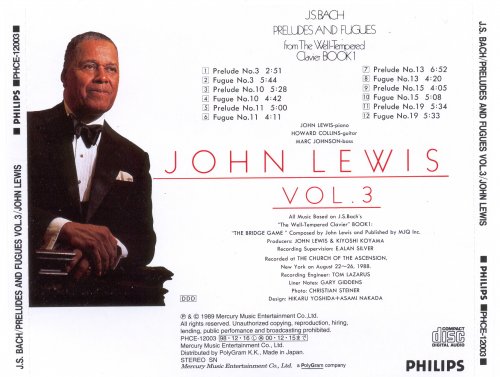
CD3 - 1:00:49
01. Prelude No. 3 - 3:02
02. Fugue No. 3 - 5:50
03. Prelude No. 10 - 5:33
04. Fugue No. 10 - 4:53
05. Prelude No. 11 - 5:04
06. Fugue No. 11 - 4:19
07. Prelude No. 13 - 6:58
08. Fugue No. 13 - 4:28
09. Prelude No. 15 - 4:10
10. Fugue No. 15 - 5:15
11. Prelude No. 19 - 5:39
12. Fugue No. 19 - 5:39
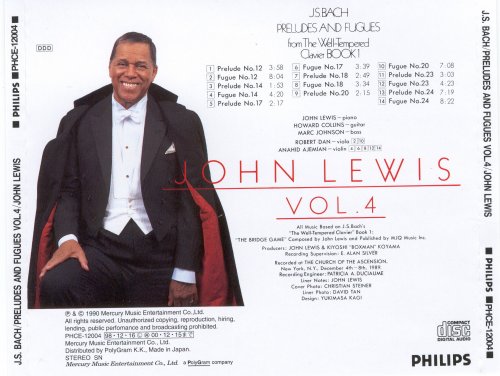
CD4 - 1:04:02
01. Prelude No. 12 - 4:03
02. Fugue No. 12 - 8:09
03. Prelude No. 14 - 1:56
04. Fugue No. 14 - 4:25
05. Prelude No. 17 - 2:20
06. Fugue No. 17 - 3:44
07. Prelude No. 18 - 2:52
08. Fugue No. 18 - 3:39
09. Prelude No. 20 - 2:18
10. Fugue No. 20 - 7:14
11. Prelude No. 23 - 3:06
12. Fugue No. 23 - 4:28
13. Prelude No. 24 - 7:22
14. Fugue No. 24 - 8:27

CD1 - 0:56:20
01. Prelude No. 1 - 3:02
02. Fugue No. 1 - 8:00
03. Prelude No. 2 - 3:22
04. Fugue No. 2 - 4:19
05. Prelude No. 6 - 3:32
06. Fugue No. 6 - 5:48
07. Prelude No. 7 - 6:31
08. Fugue No. 7 - 3:33
09. Prelude No. 21 - 3:55
10. Fugue No. 21 - 4:46
11. Prelude No. 22 - 5:33
12. Fugue No. 22 - 4:00

CD2 - 0:51:29
01. Prelude No. 9 - 3:12
02. Fugue No. 9 - 3:48
03. Prelude No. 4 - 5:56
04. Fugue No. 4 - 5:10
05. Prelude No. 5 - 3:56
06. Fugue No. 5 - 4:08
07. Prelude No. 16 - 4:13
08. Fugue No. 16 - 6:56
09. Prelude No. 8 - 4:32
10. Fugue No. 8 - 9:38

CD3 - 1:00:49
01. Prelude No. 3 - 3:02
02. Fugue No. 3 - 5:50
03. Prelude No. 10 - 5:33
04. Fugue No. 10 - 4:53
05. Prelude No. 11 - 5:04
06. Fugue No. 11 - 4:19
07. Prelude No. 13 - 6:58
08. Fugue No. 13 - 4:28
09. Prelude No. 15 - 4:10
10. Fugue No. 15 - 5:15
11. Prelude No. 19 - 5:39
12. Fugue No. 19 - 5:39

CD4 - 1:04:02
01. Prelude No. 12 - 4:03
02. Fugue No. 12 - 8:09
03. Prelude No. 14 - 1:56
04. Fugue No. 14 - 4:25
05. Prelude No. 17 - 2:20
06. Fugue No. 17 - 3:44
07. Prelude No. 18 - 2:52
08. Fugue No. 18 - 3:39
09. Prelude No. 20 - 2:18
10. Fugue No. 20 - 7:14
11. Prelude No. 23 - 3:06
12. Fugue No. 23 - 4:28
13. Prelude No. 24 - 7:22
14. Fugue No. 24 - 8:27
When Wynton Marsalis made a splash as a jazz musician playing classical music, record companies sensed a winning formula. It's still nearly impossible to get an original jazz composition recorded, but all of a sudden jazz musicians have been offered the run of the Baroque and Classical repertory, ready or not.
Amid the follow-the-leader frenzy, one of the more promising projects was an album of J. S. Bach pieces played by the Modern Jazz Quartet's pianist, John Lewis. Bach's contrapuntal thinking, and the strong sense that his compositions are frozen improvisations, have made him a consistent favorite of jazz composers, while the walking bass lines of many Bach pieces have encouraged jazz musicians through the years to ''swing'' Bach, an adaptation that often works surprisingly well. As leader of the Modern Jazz Quartet, John Lewis often aimed for a fusion of chamber music and jazz, and he went beyond simply transcribing Bach pieces. He also took some of Bach's lessons into his own music, writing fugues such as ''Concorde'' and arrangements in which the Modern Jazz Quartet used Bachian counterpoint.
It's puzzling, then, to hear an album gone so wrong as Mr. Lewis's ''Preludes and Fugues from the Well-Tempered Clavier, Book I'' (Philips). It is not straight classical Bach, swinging Bach or improvisations on Bach tunes, but an odd assortment of all three gambits - six Bach preludes and fugues (in C major, C minor, D minor, E-flat major, B-flat major and B-flat minor) played from the page, interspersed now and then with passages of ''chamber jazz.'' Mr. Lewis plays the preludes as solos, while in the fugues he shares the counterpoint with violin, viola, guitar and string bass.
Thus, Mr. Lewis tampers with Bach's proportions from the outset; he does not try to make the definitive piano version of the Well-Tempered Clavier. Yet given that Bach was an improviser himself, and that he had no qualms about taking liberties with music from previous centuries, the thought of Bach mixed with Bachian reveries isn't entirely appalling. At least it's not disco Beethoven.
In the Modern Jazz Quartet, Mr. Lewis has been widely praised for his limpid tone and his restraint - two qualities that can't hurt a Bach player. He acquits himself well in some of the preludes, playing with warmth and clarity and choosing his anachronisms carefully. In the melancholy B-flat minor prelude, he hints at Chopin; in the B-flat major, he sidles away from Bach's arpeggiations and sneaks into a little bit of ragtime.
But where things get more complicated, Mr. Lewis cheats. By just playing one line of each fugue, he doesn't rise to the challenge of Bach's polyphony. Perhaps that is just as well; the E-flat major prelude is itself a large-scale fugue, and Mr. Lewis's solo neither maintains a steady tempo nor suggests Bach's architectural logic. As it turns out, however, the ensemble transcriptions do a disservice to the fugues. They all trundle along at virtually the same placid tempo, without the dramatic momentum of Bach's unfolding counterpoint.
Mr. Lewis has made a mistake shared by many casual classical-music listeners. Because the music isn't amplified and doesn't have a drumbeat, he stereotypes it as calming, gentle, genteel music, music that's not allowed to kick. Bach's drama may be abstract - the play of rising and falling melodies intersecting in harmony, the suspense of ever more distant modulations, the drive of steady rhythms breaking into syncopation - but interpreters from Igor Kipnis to Glenn Gould to Friedrich Gulda have made that drama startling and immediate. On his Bach album, Mr. Lewis's genuine affection for the composer doesn't come through his playing. With the ensemble, and sometimes by himself, he makes Bach sound like background music.
Amid the follow-the-leader frenzy, one of the more promising projects was an album of J. S. Bach pieces played by the Modern Jazz Quartet's pianist, John Lewis. Bach's contrapuntal thinking, and the strong sense that his compositions are frozen improvisations, have made him a consistent favorite of jazz composers, while the walking bass lines of many Bach pieces have encouraged jazz musicians through the years to ''swing'' Bach, an adaptation that often works surprisingly well. As leader of the Modern Jazz Quartet, John Lewis often aimed for a fusion of chamber music and jazz, and he went beyond simply transcribing Bach pieces. He also took some of Bach's lessons into his own music, writing fugues such as ''Concorde'' and arrangements in which the Modern Jazz Quartet used Bachian counterpoint.
It's puzzling, then, to hear an album gone so wrong as Mr. Lewis's ''Preludes and Fugues from the Well-Tempered Clavier, Book I'' (Philips). It is not straight classical Bach, swinging Bach or improvisations on Bach tunes, but an odd assortment of all three gambits - six Bach preludes and fugues (in C major, C minor, D minor, E-flat major, B-flat major and B-flat minor) played from the page, interspersed now and then with passages of ''chamber jazz.'' Mr. Lewis plays the preludes as solos, while in the fugues he shares the counterpoint with violin, viola, guitar and string bass.
Thus, Mr. Lewis tampers with Bach's proportions from the outset; he does not try to make the definitive piano version of the Well-Tempered Clavier. Yet given that Bach was an improviser himself, and that he had no qualms about taking liberties with music from previous centuries, the thought of Bach mixed with Bachian reveries isn't entirely appalling. At least it's not disco Beethoven.
In the Modern Jazz Quartet, Mr. Lewis has been widely praised for his limpid tone and his restraint - two qualities that can't hurt a Bach player. He acquits himself well in some of the preludes, playing with warmth and clarity and choosing his anachronisms carefully. In the melancholy B-flat minor prelude, he hints at Chopin; in the B-flat major, he sidles away from Bach's arpeggiations and sneaks into a little bit of ragtime.
But where things get more complicated, Mr. Lewis cheats. By just playing one line of each fugue, he doesn't rise to the challenge of Bach's polyphony. Perhaps that is just as well; the E-flat major prelude is itself a large-scale fugue, and Mr. Lewis's solo neither maintains a steady tempo nor suggests Bach's architectural logic. As it turns out, however, the ensemble transcriptions do a disservice to the fugues. They all trundle along at virtually the same placid tempo, without the dramatic momentum of Bach's unfolding counterpoint.
Mr. Lewis has made a mistake shared by many casual classical-music listeners. Because the music isn't amplified and doesn't have a drumbeat, he stereotypes it as calming, gentle, genteel music, music that's not allowed to kick. Bach's drama may be abstract - the play of rising and falling melodies intersecting in harmony, the suspense of ever more distant modulations, the drive of steady rhythms breaking into syncopation - but interpreters from Igor Kipnis to Glenn Gould to Friedrich Gulda have made that drama startling and immediate. On his Bach album, Mr. Lewis's genuine affection for the composer doesn't come through his playing. With the ensemble, and sometimes by himself, he makes Bach sound like background music.
Download Link Isra.Cloud
John Lewis - Bach: Preludes and Fugues from the Well-Tempered Clavier Book 1-4 (1985 - 1990)
My blog
John Lewis - Bach: Preludes and Fugues from the Well-Tempered Clavier Book 1-4 (1985 - 1990)
My blog
Jazz | Classical | Discography | FLAC / APE
As a ISRA.CLOUD's PREMIUM member you will have the following benefits:
- Unlimited high speed downloads
- Download directly without waiting time
- Unlimited parallel downloads
- Support for download accelerators
- No advertising
- Resume broken downloads


